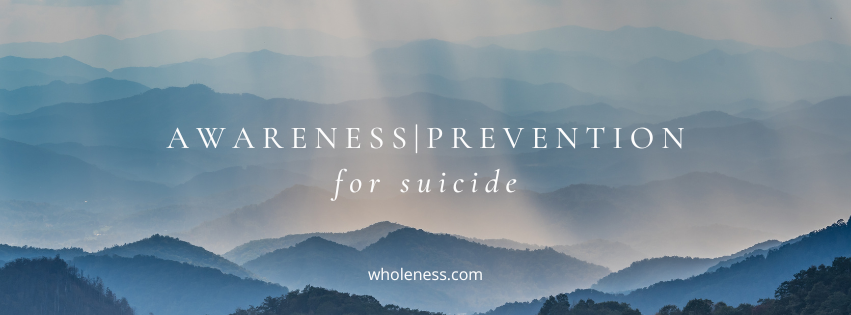
Suicide Prevention: Recognizing Risk Factors, Warning Signs, and New Approaches
“Suicide is a heartbreaking reality that affects many lives every year,” says Dr, Suzanne Blaising, PhD. Wholeness Center is a leader in innovative and integrative mental health. This September which is suicide prevention month, we wanted to shed the stigma around suicide and provide you with the tools you need to help prevent this global epidemic from spreading.
Despite all the advancements in mental health care, some people still struggle to find treatments that work for them, especially when they are feeling hopeless and overwhelmed. It’s important to identify individuals with risk factors and warning signs. The American Psychiatric Association lists the following:
RISK FACTORS FOR SUICIDE
- Previous suicide attempt(s).
- A history of suicide in the family.
- Substance use.
- Mood disorders (depression, bipolar disorder).
- Access to lethal means (for example, keeping firearms in the home or having access to unsecured prescription medications)
- Losses and other events (for example, the breakup of a relationship or a death, academic failures, legal difficulties, financial difficulties).
- History of trauma or abuse.
- Bullying.
- Chronic physical illness, including chronic pain.
- Exposure to the suicidal behavior of others.
- Social isolation.
- Historical trauma.
- Stigma associated with seeking help.
WARNING SIGNS OF SUICIDE
- Often talking or writing about death, dying or suicide.
- Making comments about being hopeless, helpless or worthless.
- Expressions of having no reason for living; no sense of purpose in life; saying things like “It would be better if I wasn’t here” or “I want out.”
- Increased alcohol and/or drug use.
- Withdrawal from friends, family and community.
- Reckless behavior or more risky activities, seemingly without thinking.
- Dramatic mood changes.
- Talking about feeling trapped or being a burden to others.
It’s important to identify these warning signs and help an individual seek treatment as a means to decrease risk factors. Similarly, bolstering protective factors in an individual can help prevent suicide.
SUPPORTIVE MENTAL HEALTH
- Contacts with providers (such as, follow-up phone call from health care professional).
- Effective mental health care; easy access to a variety of clinical interventions.
- Feelings of strong connections to individuals, family, community and social institutions.
- Strong sense of cultural identity.
- Problem-solving and conflict resolution skills.
Innovative Treatments for Suicide Prevention
In addition, scientists have been exploring new ways to help prevent suicide. Read on as Dr. Suzanne Blaising, PhD tells us about two substances—ketamine and psilocybin—showing promise in this important area.
Ketamine has been around for a long time, mainly as an anesthetic used in surgeries. Researchers have discovered that it can also be a powerful tool in treating depression, especially in cases where other treatments haven’t worked. Ketamine works by changing certain chemicals in the brain, which helps to lift mood and reduce feelings of hopelessness. ketamine can begin to relieve severe depression and suicidal thoughts within hours. This quick action is crucial for someone who might be thinking about suicide and needs immediate relief. While the effects can be rapid, they are often short-term, so ketamine is usually part of a broader treatment plan that includes therapy and other support.
Psilocybin, on the other hand, is the active ingredient in certain types of mushrooms, often called “magic mushrooms.” It has been used in some cultures for centuries but is now being studied for its potential mental health benefits. Psilocybin is different from ketamine in that it often leads to a deep, sometimes spiritual experience. People who take psilocybin under the guidance of a professional often describe a shift in how they see themselves and the world around them. This change in perspective can help people stuck in negative thought patterns, making it easier to find new hope and purpose in life. Studies show that psilocybin can help reduce symptoms of depression and anxiety, which are two major factors that can lead to suicide. By promoting a sense of connection and understanding, psilocybin may help people feel more grounded and less alone, which is crucial in preventing suicide.
For many people, the standard treatments for depression and anxiety – therapy and medication—are enough. However, for others, these treatments don’t work as well or take too long to provide relief. This is where ketamine and psilocybin could make a big difference. By offering new ways to help those in crisis, we might be able to prevent more suicides and offer hope to those who need it most.
While ketamine and psilocybin show promise, they are not without risks. Both substances can have strong effects on the mind, and they should only be used in a safe, controlled environment with the help of trained professionals. This ensures that the treatments are effective and that any potential side effects are managed carefully.
Wholeness Center’s Approach to Suicide Prevention
Wholeness Center is a leader in providing mental health solutions for treatment-resistant depression, such as our Ketamine Assisted Therapy program. Would you like to know more? We offer a free consultation for new patients to discuss their mental health needs and goals. If you or someone you know is seeking healing and wholeness, please contact the Wholeness Center at 970-221-1106 to learn more.
Wholeness Center offers mental health repair and restoration in Ft. Collins, CO.

Leave a Reply